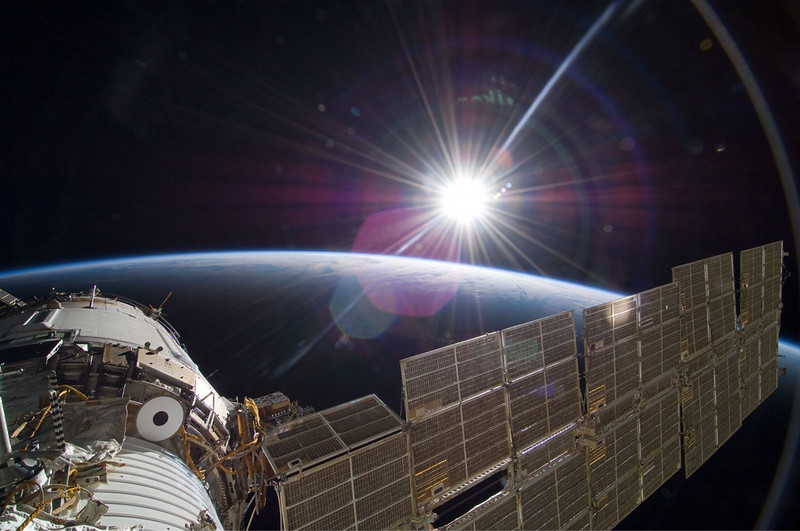Media Advisory: To Improve Health on Earth, NIH-Funded Tissue Chips Push New Boundaries in Space

The sun rising over the International Space Station and Earth. (NASA)
March 2, 2020
WHAT: With the help of a Falcon 9 rocket, National Institutes of Health-supported research teams will send tiny, bioengineered models of human organs hurtling toward the International Space Station U.S. National Laboratory (ISS National Lab) at thousands of miles per hour. The launch, which will carry tissue chips modeling heart and gut tissue, is scheduled to take place no sooner than March 6, 2020, from Cape Canaveral, Florida.
Tissue chips are miniature, 3-D models of human tissues, such as the lung and liver, designed to mimic functions of the human body and support living human tissues and cells. By studying heart and gut tissue models on the ISS National Lab, researchers hope to learn more about molecular changes in heart tissues exposed to the extreme environment of microgravity and get new insights into immune responses in the intestine that could help improve human health back on Earth.
The low-gravity environment on the ISS National Lab presents valuable opportunities for research that are not found on Earth. For example, low-gravity environments can cause changes in the human body that are similar to accelerated disease and aging processes. Because these changes happen relatively quickly, the tissue chips sent to the ISS National Lab allow researchers to model and study — on a much shorter timescale — conditions related to aging and disease that might take years to develop on Earth.
Both projects are funded through the Tissue Chips in Space initiative, which is a collaboration among the ISS National Lab and the NIH’s National Center for Advancing Translational Sciences (NCATS) and National Institute of Biomedical Imaging and Bioengineering.
WHEN: Launch is scheduled for no sooner than March 6, 2020 at 11:50 p.m. ET; monitor twitter.com/Space_Station for schedule changes
WHERE: Cape Canaveral, Florida
NIH SPOKESPEOPLE:
Danilo Tagle, Ph.D., Associate Director for Special Initiatives, NCATS
Lucie Low, Ph.D., Scientific Program Manager, Tissue Chip for Drug Screening, NCATS; NIH-NASA Liaison Point of Contact, HHS-NASA Interagency Agreement Coordinator
To schedule interviews with NCATS staff, please email ncatsinfo@mail.nih.gov or call 301-435-0888.
MORE INFORMATION:
For more information on NCATS and its tissue chip program, see —
HIGHLIGHTS:
Project Details: Five tissue chip projects have already completed their first flight, but none have included heart or gut tissues.
- The tissue chip project led by researchers at the University of Washington, Seattle and Johns Hopkins University will compare heart tissue grown on Earth with tissue grown in the low-gravity environment of the ISS National Lab over time to assess visible changes to the tissue as well as changes at the molecular level.
- The project led by researchers at Emulate, Inc., a biotechnology company, will look at how the cells that line intestines, including immune cells, respond to salmonella bacteria and whether probiotics — such as the bacteria found in yogurt and other foods — protect the gut from infection. These findings could help scientists better understand the impact of low gravity on immune responses, which could lead to new avenues for preventing or treating foodborne infections on Earth.
Applying Lessons Learned: Both projects benefited from the tissue chip projects that launched on previous flights. For instance, the gut tissue chip includes a simplified version of a pumping system that flew in May 2019, thereby reducing chances for malfunctions during takeoff and return or while in orbit.
Earth-bound Analysis: Both of the projects going up in March have earth-bound counterparts. More analysis will occur once the projects sent to the ISS National Lab have returned to Earth and the projects can be compared. Insights gained will help inform plans for the projects’ second flights. In fact, although data analysis is ongoing for the five projects that returned from their trip to the ISS National Lab last year, findings have already led to hardware advances for current projects and to fine-tuning hypotheses and research plans for projects that will return to the ISS National Lab.
Technology Development: NCATS and partners from academia, industry and other federal agencies are working to develop tissue chips as predictable and useful models for testing the safety and effectiveness of candidate drugs, vaccines or biologic agents in humans. In addition to offering important biomedical insights, the Tissue Chips in Space initiative is accelerating technological innovation.
About the National Center for Advancing Translational Sciences (NCATS): NCATS conducts and supports research on the science and operation of translation — the process by which interventions to improve health are developed and implemented — to allow more treatments to get to more patients more quickly. For more information about NCATS, visit ncats.nih.gov.
About the National Institute of Biomedical Imaging and Bioengineering (NIBIB): NIBIB’s mission is to improve health by leading the development and accelerating the application of biomedical technologies. The Institute is committed to integrating engineering and physical sciences with biology and medicine to advance our understanding of disease and its prevention, detection, diagnosis, and treatment. NIBIB supports emerging technology research and development within its internal laboratories and through grants, collaborations, and training. More information is available at the NIBIB website: www.nibib.nih.gov.
About the National Institutes of Health (NIH): NIH, the nation's medical research agency, includes 27 Institutes and Centers and is a component of the U.S. Department of Health and Human Services. NIH is the primary federal agency conducting and supporting basic, clinical, and translational medical research, and is investigating the causes, treatments, and cures for both common and rare diseases. For more information about NIH and its programs, visit www.nih.gov.


